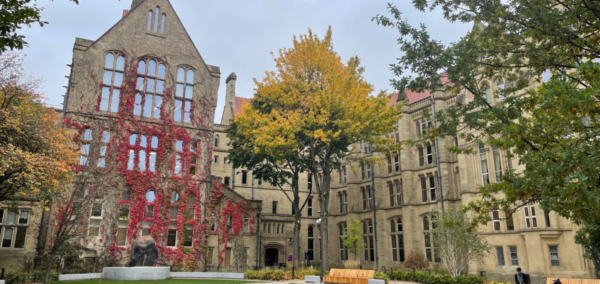
Birmingham City University is facing backlash for axing its Black studies course
Critics have warned it could end Black studies in UK higher education
Birmingham City University (BCU) has faced widespread criticism following its decision to cancel its undergraduate Black Studies course, a programme led by Professor Kehinde Andrews.
The move has been condemned as “thinly veiled” racism by Hakim Adi, Britain’s first professor of African descent, and has raised concerns about the broader implications for Black academics and students in higher education.
Professor Adi, who was made redundant in 2023 after Chichester University cut his popular MRes African history course, has denounced the decision, pointing to a disturbing trend of attacks on Black-focused courses and scholarship.
“These decisions always amount to thinly-veiled racist attacks because they disproportionately affect certain subjects, certain students, and certain academics,” Professor Adi told The Voice. “Such courses are a means to repair the damage created by Eurocentrism, in the existing curriculum, both in schools and in higher education.”
His criticism was echoed by Professor Kehinde Andrews, who has been at the forefront of the Black studies programme at BCU. He argues that the cancellation stems from a lack of institutional support, compounded by the university’s decision to make the course redundant. The university cited “low recruitment numbers” as the reason for the course’s closure, a justification Andrews says he finds questionable.
“We’ve got a new Black VC, and it’s not a coincidence,” Professor Andrews said. “If we had a White VC, we wouldn’t have these problems. The Black VC can do this in a way which would be much more difficult for a White leadership team to do.”
A missed opportunity for Black studies
Most Read
Professor Andrews further explained that the Black studies course had never been allowed to develop fully, with disruptions such as COVID-19, staffing shortages, and his own personal challenges – including the death of his wife – hindering its progress. He also pointed to the university’s failure to support recruitment strategies despite having a clear plan to boost student interest.
“We didn’t even know if the undergraduate course was going to run until we had a meeting in May of this year. And so we couldn’t do all the outreach we could have done,” Professor Andrews said. “BCU then decided to let it run at the last minute, but of course no recruitment had happened. They then used that to say, look, nobody wants to do the course.”
He contended that this situation exposed a deeper issue, revealing that the university’s leadership had likely decided to cut the course long before recruitment numbers were considered.
“I had to threaten to leave to even get a meeting,” Professor Andrews explained. “We had the meeting, and it became clear that senior management had had these plans for at least six months. I am almost 100 per cent sure that based on the questions asked in the meeting, senior management had not even read the document, and the decision had already been made.”
The unique value of Black studies
The Black studies course was designed not just to study Black history and culture but to engage students with the community through practical, transformative work. Professor Andrews emphasised that this community component was essential to the course’s mission.
“One of the most important things about Black studies is you have to go and engage with the community. You have to go and do something which is practically beneficial to the community,” he said. “It’s all about saying how we do university differently, and how we teach that to the students.”
Professor Andrews also expressed his concern that the cancellation of the undergraduate course could ultimately spell the end of Black studies in the UK’s higher education system, particularly given the difficulty in maintaining such a programme without the support of undergraduates.
“The MA is great, but the MA student numbers can’t fund and maintain the staff numbers. You need undergraduates for this. This is the structural problem,” he explained.
“So my big worry here, If I’m honest, is that I think this will be the decision that will end Black studies at the university full stop. And therefore end Black studies in UK higher education.”
BCU’s response
In defence of the decision, a spokesperson for Birmingham City University stated that the undergraduate Black studies course had not generated sustained demand despite extensive promotion and outreach efforts. However, the university announced plans to launch a Black studies MA in 2025 as part of its ongoing commitment to the subject.
When BCU was asked on their response to these statements and accusations, a BCU spokesperson told The Birmingham Tab: “BCU has consistently demonstrated its commitment to creating a more diverse and inclusive curriculum, launching Europe’s first-ever Black Studies degree course in 2017.
“Despite significant promotion and focus – with extensive marketing, outreach and media work – demand for the undergraduate course remained low for a sustained period of time.
“We have a continuing commitment to this subject through the Black studies MA that we anticipate launching for prospective students in 2025.”
However, critics argue that the underlying issue is not just recruitment, but a failure to truly support Black studies and Black academics within the institution. Professor Andrews pointed out that despite the university’s public commitment to diversity, it has never effectively supported the course in terms of marketing and outreach.
“There always has been a lack of support but the marketing has been terrible. We’ve been pushing for years and it’s just not there. We got MA students to create a whole campaign. They just wouldn’t market it,” Andrews said.
The future of Black studies in the UK
Both Adi and Andrews are concerned that the cancellation of Black studies at BCU could have broader implications for the subject across UK higher education. While there have been public attacks on Critical Race Theory and Black studies in the United States, the situation in the UK is more insidious, according to Professor Andrews.
“In the UK there is nothing really to attack. In higher education there is so little there, that when we’re attacked, it’s existential,” he explained. “If you lose Black studies and no one picks it up, say we then lose the MA and no one picks it up. Then it’s gone for good. There’s nothing equivalent to it.”
Despite these setbacks, Professor Andrews remains resolute about the importance of Black studies, noting the profound impact it has had on students. Many have gone on to achieve academic success, with some now pursuing PhDs or working in various industries.
“People’s fears are justified,” Professor Andrews said, referencing the uncertainty surrounding the future of Black studies at BCU. “The launch of Black studies at the time was a big PR thing, and BCU were very public when they launched it. But now they should be public about why they are dropping it.”
However, in response, he remains hopeful that Black studies will continue outside of the university system, driven by the community and its advocates.
“Black studies will continue in the community regardless. It’s far too important to leave to the whims of institutionally racist universities,” Professor Andrew concluded.
Featured image via BCU on YouTube



















